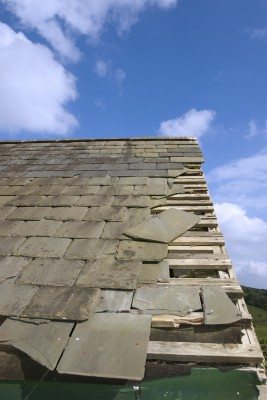
You may have wondered what actually causes a roof to deteriorate. It would seem like they should last forever, but this isn’t the case and most last around 30 years or less. Because your roof is constantly exposed to the elements, it is only natural that it will wear and age over time.
Common Causes of Roof Deterioration
Wind – Wind can severely impact a roof because strong winds have the ability to actually lift the edges of your roof’s shingles, which leaves them vulnerable and exposed to the water and debris that can be blown underneath the shingles by wind.
Rain – Water that finds its way underneath roofing materials such as shingles will typically resulting in the decking and rafters to begin to rot. Once these components begin to rot, the structural integrity of your roof begins to be significantly impacted. If you moisture happens to find its way into your house through your roof, you may experience water damage to your home’s walls, insulation, ceilings, and electrical.
The Sun – Heat and ultraviolet from the sun have a tendency to cause your roofing materials to age faster, especially the surfaces of your roof that are west or south facing.
Condensation – Condensation is the result of water vapor changing from a gas form to a liquid form. This is why you may see water droplets on blades of grass in the morning. The same thing happens in poorly ventilated areas in your home, such as your attic. Condensation that is allowed to occur in an attic can lead your roof decking and rafters to start rotting. After they begin to rot, water can seep in because the structural integrity of your roof is now compromised.
Trees & Leaves – Trees and leaves that have grown to the point of actually touching your roof can begin to cause some major problems if left unaddressed. A tree branch that falls onto your roof can seriously damage your roof, and leaves that accumulate on your roof can clog your rain gutters and retain moisture. Lack of proper drainage, the presence of water, and excess moisture in the leave can cause water to seep into your roofing materials and result in rotting and other damage.
Snow & Ice – Snow and ice are a well-known threat to a home’s roof. The weight of snow and ice is bad enough, but snow that begins melting off of a roof often ends up re-freezing as it trickles to the edge of your roof (called the overhang) where the roof temperature is usually much cooler. This re-freezing of melting snow at the edge of your roof can result in the formation of ice dams, which block proper drainage of water into the gutter and can result in water backing up under your roofing materials. Once the water begins to back up into your roofing materials, it can seep into your home’s interior and cause some real problems.
Deterioration of Your Roof’s Flashing – Your roof needs to have strong and tight-fitting flashing around your chimney, vents, and wall/roof junctions because a strong and tight fit is required to properly keep water out. If your flashing is loose or deteriorating, water may find its way into your home through gaps and other penetrations.
Missing or Damaged Shingles – When your roof has missing and/or damaged shingles, the structural integrity of your roof is essentially compromised, which can leave the roof vulnerable to water damage because missing or damaged shingles make it much easier for other shingles to be blown off by strong winds.
To ensure that you address potential roof problems before they start causing major issues, you should inspect your roof several times throughout the year for signs of premature wear and aging. If you don’t feel comfortable or qualified inspecting your own roof, you can have a licensed roofing contractor take a look for you.

